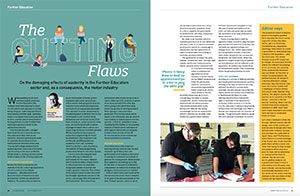 The following article, written by Gavin White, Autotech Recruit’s Managing Director, has appeared in the IMI Magazine, September 2017 issue, pp. 40-41.
The following article, written by Gavin White, Autotech Recruit’s Managing Director, has appeared in the IMI Magazine, September 2017 issue, pp. 40-41.
THE CUTTING FLAWS
On the damaging effects of austerity in the Further Education sector and, as a consequence, the motor industry.
While spending on schools has been largely protected, Further Education (FE) colleges have been exposed to years of cuts which have resulted in courses being dropped, staff being laid off and enrichment activities axed. Spending today is no higher than it was way back in 1990, and this lack of investment is leaving behind a horde of millennials wanting to pursue a career in the automotive industry.
Over the last ten years, colleges have been forced to severely narrow the curriculum they offer as our austerity-obsessed government seeks to maintain the excellence of our institutions at a fraction of the cost. This has left college administrators squeezing every ounce out of lecturers and focusing on the more profitable STEM subjects, leaving courses such as vehicle repair at risk of being wiped out.
EDUCATION IS PARAMOUNT
As the UK charts a course for life outside of the EU, a thriving automotive sector is critical to our future prosperity – and education must be at the heart of the drive to raise productivity within the automotive industry. To achieve this we need to boost the number of home-grown engineers and motor technicians – which means reshaping both how the industry is perceived and respected, and how our young people are taught. Two decades of under investment in the development of skills in the UK has contributed to our country being behind the rest of Europe in the most basic of skills so, unless action is taken now, we will be faced with a severe shortage of talent which will act as a major drag on future economic growth. Within manufacturing in general, research by Engineering UK found an additional 1.8mn engineers and technically qualified people are needed by 2025. But, currently, there is a 20,000-a-year shortfall in the number of these people being produced by Britain’s education system.
It is vital that this stripped back course offering is rebalanced, particularly for the motor industry which needs an influx of new blood to ensure we have the educated manpower needed to sustain the trade’s upward trajectory. The revival of the industry over the last few years has brought significant success to the sector, and around 800,000 jobs have been sustained. The value of the automotive aftermarket alone is set to rise to £28bn by 2022, with the creation of an expected 400,000 roles. But who’s going to fill them? And what about the exodus of retiring workers? Who’s going to take over these positions? It’s a serious issue which needs to be addressed, and we need to start looking at school leavers and the options, or lack of, available to them.
Fuelling the fire further is the looming shadow of Brexit which will leave us with tighter restrictions on bringing in talent from outside of the UK. So the education of our current and future workforce is essential.
RETHINK REQUIRED
For several years now there has been a growing concern that the lack of joined-up thinking from the government over technical education is leading to a reduced curriculum in general for young people. Westminster does appear to be waking up to this.
At the start of the year it published a consultation on industrial strategy and pledged a recommitment to industry – both of which were well received by the automotive sector. And it remains to be seen if the announcement of the new ‘T-level’ system, which is set to put technical education on a more even footing with academic work in a bid to improve Britain’s levels of productivity, will filter down into the automotive industry.
We work in an industry which is typically perceived as an old-fashioned and dirty trade, so it needs to be made an attractive option at a young age to ensure that the next generation of talent is enthusiastic and willing to learn the necessary skills.
This generation includes the aptly dubbed ‘millennials’ who, through their online culture and communication habits, are way more connected and in-tune with technology, ready to embrace the digitalisation of our industry. A recent report by the SMMT revealed that if the UK automotive industry continues to incorporate digitalisation there could be a £8.6bn value added to the UK economy every year up to 2035 – crystallising the need to remain competitive, attract millennials and demonstrate the advancements which have already been made. Along with vehicles becoming increasingly technical, demand for electric vehicles has recently been fuelled by a government-backed £270mn investment and plans to ban the sale of petrol and diesel cars by 2040. All well and good, but we need the workforce to be fully proficient in these vehicles!
Plenty is being done to beef up apprenticeships in a bid to plug the skills gap, and the introduction of the levy has certainly put apprenticeships into sharper focus. But, whilst apprentices are recognised as a route to harness fresh talent, blueprints for courses and syllabuses can differ wildly. What one apprentice might be learning at a global car manufacturer will be different to an apprentice on weekly day release from an independent garage. This completely limits the growth potential for both.
LIFELONG LEARNING
Building in a culture of lifelong learning and training into the automotive workers of today is the way forward to not only address the sector’s current skills shortage, but also ensure that a flexible, highly skilled and productive workforce is maintained for years to come.
Getting the education framework right is essential if the automotive economy of this country is to thrive. It is the only way to address the growing productivity and skills gap and offers a lifeline into employment for millions of people. The government needs to grasp this now and put the wheels in motion.
Click here to view the article in the IMI Magazine.
